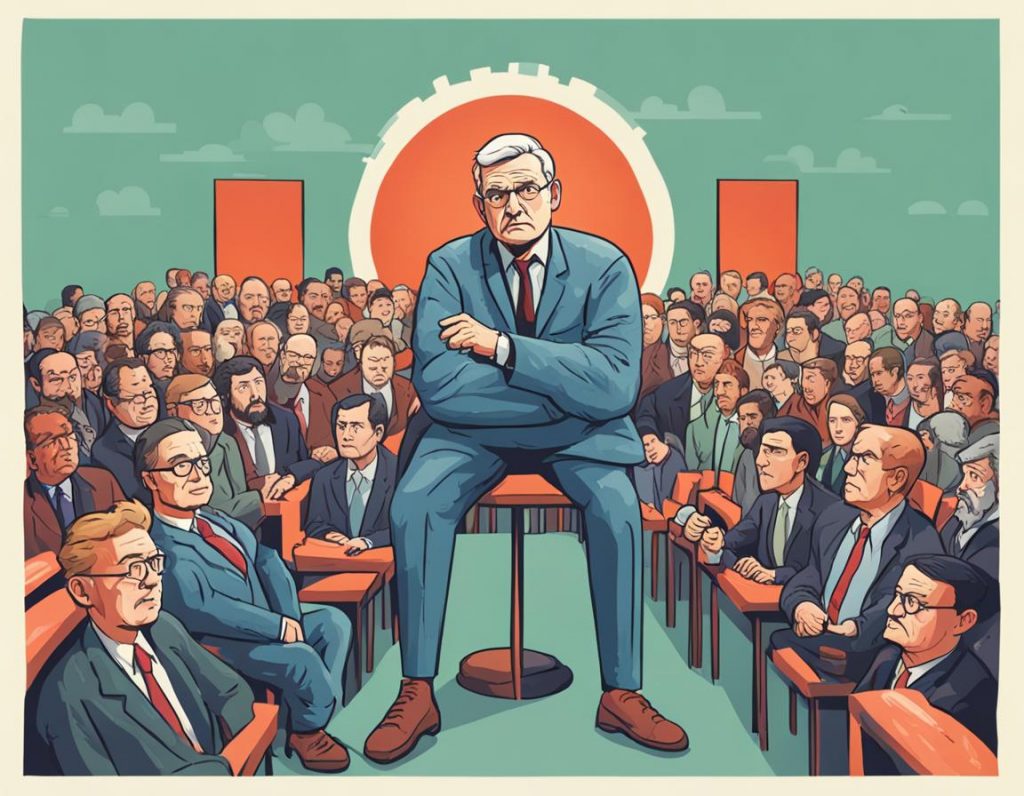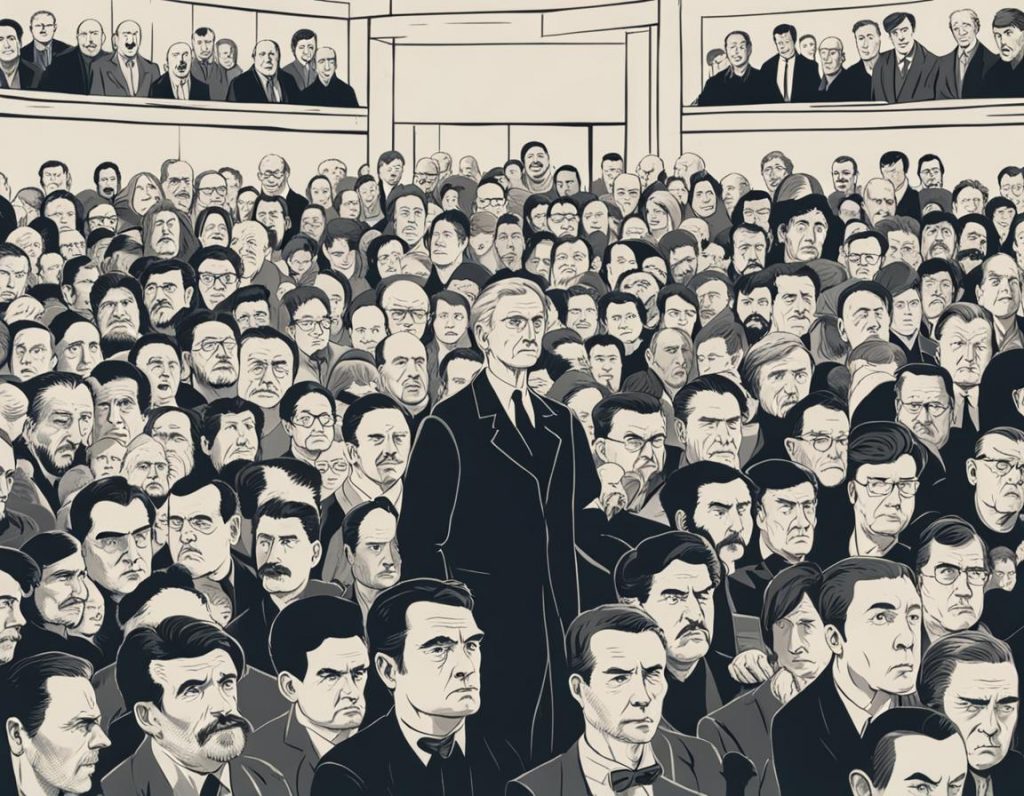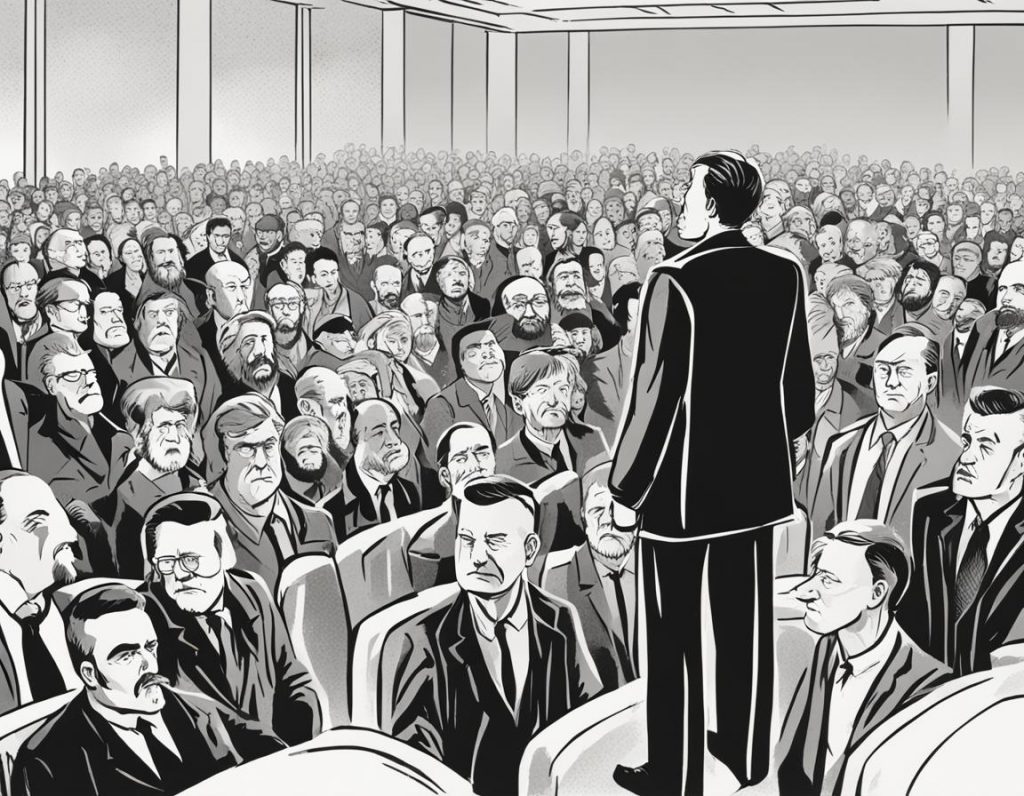
Here, I would like to suggest some reasons why someone might be justified in questioning their tacit, unswerving allegiance to the consensus.
Firstly, did you realise you were in an ongoing agreement? Because you may not have realised this, and you may not have already decided to say ‘no’ and walk away. What would that take? Simply that. Your refusal to continually go into agreement to that which no longer serves you – in your outer life, as well as your inner life. One produces a reflection of the other.
We have wars started by greedy idiots, bloodthirsty zealots and control-hungry ideological fundamentalists. We are brought to question whether we might abstractly agree or disagree that a given group of people could justifiably be blown to pieces, as though this were somehow our call. Your agreement or disagreement here doesn’t matter in order to qualify as insanity; what matters is that you are demanded to be on beck and call to participate in the insanity served up to you by a mentally diseased consensus.
The consensus wants to force your hand into playing the game to power the illusion that you were the one choosing it. Your choice to bear witness to all of this is your agreement to it. This happens in the same way a hostage might be forced to dictate the methods of his own torture – as though being invited to weigh your opinion on this narrative represents some kind of fairness, or democracy of mind.
We have political systems which are presented on the presumption of self-evidential necessity. You may choose this stream of madness, or the other – but you must choose. Remember that you tacitly agreed to this system, because you were born into it? At least, this is the narrative, as fragile as it is. Even the most benignant and equitable of these are a travesty – you are presented with an ultimate option of choosing one terrible option over another, as though there was no alternative.
This is in the service of democracy, the abstract notion that what is best for you lies in the appearance of having the ‘freedom’ to choose what is best for your region or your nation, when all of the information you are being fed derives from a source with an agenda to exert influence and control. Everything that was ever claimed to go to work on your behalf was an empty promise, a sham.
We are the inheritors of a scientific materialism, which against all true scientific spirit, presumes to dictate the total conditions of the universe at the level of human meaning. Specifically, that there is no possibility of individual or collective human participation in divinity, because we are all simply evolutionary automatons.

Science is far from objective or disinterested – there is a wider agenda to uphold. Detraction from the mainstream narrative is punished through control of funding and decisions about how much influence you will continue to exert in academia. This is how public talks can justifiably be banned without red faces.
The new paradigm of the evil is named ‘pseudoscience’, although it has born different names as were suitable to the era or context, such as ‘witchcraft’, ‘atheism’, ‘socialism’ – essentially though, all it consists in is ‘the other’. It is the elephant in the room no one wants to discuss because it would undermine the authority of the institution in question.
All that this ‘other’ is ever reminding you of is the simple fact that you can’t ever know for certainty what you think you know – that is all it is, and yet this represents the vital human umbilical connection into the wider spiritual universe.
Our various cultural institutions’ insistence on the rigidity and finality of the knowledge they produce is leading us to squander our multidimensional heritage, our imagination, our shared godhood. What appears to be the groundlessness of epistemic uncertainty is far too subversive to those who pretend to this authority. So, the label ‘pseudoscience ‘is the new brush you will be tarred with if you dare detract from this reactive and emotionally fragile scientific consensus.
These are churches, if you haven’t noticed – there are priests, altars and rules to be followed. Dissent is not appreciated, and while we may no longer burn people at the stake physically, the same consequences can now be effected ruthlessly via social media. Technology has ironically permitted the expansion of ostracism to the digital realms, which are the foreshore of our mental meeting grounds as human collectives.
To adhere to a mindset whereby the majority of people in your culture will turn their backs on a person and say ‘we don’t acknowledge this person anymore’ is not only merely unhealthy, it indicates a collective personality disorder. Refusing to acknowledge a person whom the mainstream collective disapproves of is one of the tallest, broadest and brightest of red flags. It happens in small groups such as family groups and office environments, and it happens in nations – as above, so below. And yet, we retain the freedom to decide as the inheritors of the totality of human culture as to whether such behaviour is worthy to be kept.
The catch is, anything we sleep on is kept automatically. All it takes for the majority to continue to harbour such systemic insanity is to pretend that we don’t suffer from it, thereby immunising it from scrutiny. Staying asleep then becomes akin to alcohol as the ’cause of’ and ‘solution to’ all of life’s various social ills.
We have a culture in which religious institutions are offered as fictitious oases from an insane materialism, only to discover that you are being thrown out of the frying pan and into the fire. The desire to save your soul and claim you for the eternal turns out to be yet another tentacle operating on the behalf of control and delusion, though flown under the banner of spirituality. The grandiose fantasies of the worldly ego are here offered in the spiritual realm, success, being chosen, included, and living forever as the personal self you know and love. The monotheistic religions reflect all the ego’s madness and self-importance back to it in an imaginary monarchy, which consists in a personal being at the top who variously approves, disapproves, judges, or becomes pleased or angry with you as the mood takes him. Your virtue and worth will be decided by how close you can get to the feet of the king at the expense of others through your various deeds, devotions and cringing prostrations. This is all for your group, the blessed and chosen, while those who have chosen incorrectly, believed wrongly, or failed to meet the standard within your group will be expelled like refuse through a cosmic garbage-chute.
The false promise propping up all of these religious institutions is this one delusional creed: unity through separation. Be better than the others, be better than the other groups. Then you will earn favour, then you will be united, so you had better make sure you beat down all the others. In other words, the spirit realm, as contextualised by the consensus ideocracy, is that if you are well-behaved, then you will be rewarded, but if you are poorly behaved or you have believed incorrectly, you will be punished.
You are either in line, or out of line.
Can you see how the cultural influence from the consensus reveals itself in the projection of the religious? It promises you the favour of an authority who is responsive to your own animal needs, wants and desires, and unresponsive of those whom you deem unworthy or inferior. Could there be a more tantalising ego-trip on offer for the disturbed human animal?

We have a media which enjoys success on the basis of how accurately the content resembles juicy gossip. We are offered these hints of what those individuals who are implied to be far more important than us are doing with their lives such as celebrities, including those we imagine to have sufficient fame and money to have earned freedom and happiness. The more important a person is deemed to be, the less significant the news about them need be in order to warrant publication.
For example, it is more important whether members of royalty are having a minor spat or social disagreement about wearing a certain hat in public than any question of whether you have any personal freedom or satisfaction in your life, from birth to death. Most of what we call ‘news’ is presented as a drama triangle in which you are framed as the victim, in the hope of inflaming your censure toward those framed as the perpetrators.
When slaves were kept, it was a common practice to lure them with the possibility that one day they might be freed by their own efforts. This ensured that they kept up the good work and didn’t lapse into despondency which might eventually collapse into such dense suffering as to spark an inner or outer revolution.
If you want to see how it is the consensus would prefer you to keep acting and thinking, take a look at how they medicate you with empty promises of your eventual success and freedom. These empty promises are on offer at every street corner, in every wing of human society. They are all clamouring for your investment of attention.
Does this sound like a balanced, sane society? Does this sound like a valuable investment of your ongoing input as a free being? What would it take to simply say ‘no’, and walk away from all of this idiocy once and for all – even if this only happened within your own most private inner sanctum?
Perhaps Aristotle was correct in his analysis of man as a political animal, and that humankind will always be bound by social conventions and the need for society in general. The big question however is: are you human? If not, what are you? Because if you are not what you think you are, what makes us think it is sensible to reduce our deepest needs to humankind’s needs, to the needs of the animal?
What are the requirements of the soul, what are the values of the true self? Maybe there are none, perhaps consciousness is just a temporary phantom. But how would you ever know unless you first cleared the table before you of all of the clutter?
There may not be very much time left to decide, as the human animal is now engineering intelligences capable of outsmarting itself. Consider the simplicity of the parlour tricks that have led man down the garden path over ages past. What is to come will likely consist in even more powerful demonstrations of illusion and persuasion.
What better time than now to inquire into the truth of who you are?
*
Simon P Murphy is a Nelson-based esotericist and philosopher, and author of His Master’s Wretched Organ, an astonishing and surreal collection of weird fiction stories.
*
If you enjoyed reading this piece, buy a compilation of our best pieces from previous years!
Best VJMP Essays and Articles of 2023
Best VJMP Essays and Articles of 2022
Best VJMP Essays and Articles of 2021
Best VJMP Essays and Articles of 2020
Best VJMP Essays and Articles of 2019
Best VJMP Essays and Articles of 2018
Best VJMP Essays and Articles of 2017
*
If you would like to support our work in other ways, make a donation to our Paypal! Even better, buy any one of our books!
